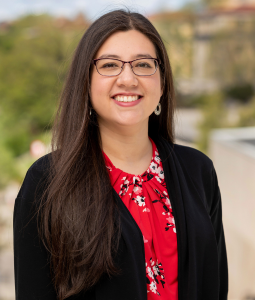 Alumni Profile: Alyssa Pon-Franklin ’12
Alumni Profile: Alyssa Pon-Franklin ’12
Degree(s): BA Psychology and Spanish, UW–Madison; MS Education, Educational Psychology, UW Milwaukee (also a Certificate in Multicultural Knowledge of Mental Health Practices)
Current Occupation: Academic Advising Manager, School of Education, UW–Madison
What are some of the benefits of your psychology degree?
I gained a strong appreciation for research through my classwork, as well as working in Dr. Alibali’s lab. Although I was more focused on direct practice, the required research components of the major really helped me learn and understand both “sides” of psychology. I also appreciated the breadth of the psychology major and the ability to personalize it to my areas of interest. When I taught a summer psychology course for middle school students, one of my favorite phrases was “Psychology is everywhere!” My understanding of how we make decisions, learn, interact, grow, function (and fall apart) has been helpful in all aspects of my life. There are practical applications for psychology, no matter the field you are in. The structure of UW’s liberal arts degree was also a benefit to me. I was able to take classes in related areas, like sociology, as well as explore my other interests (Italian, theatre, Spanish, etc), all while graduating on time.
How did you find your way to your current profession?
When I graduated from UW, I knew I wanted to help people, but I wasn’t sure what options were available, other than counseling. Mental health advocacy and treatment was very important to me, due to my own struggles with anxiety and depression. I wasn’t ready to commit to a specific direction (e.g., grad school), so I looked for opportunities to explore the field.
I worked in admissions for Rogers Behavioral Health for a couple of years, and through that position, I learned a lot about the mental health field. I worked with adult patients, families, youth, case managers, therapists, school professionals, psychiatrists, and more. Through that, I was drawn to professions that worked with adolescents, and ones that weren’t tied to barriers such as referrals/insurance/transportation. I decided to pursue my graduate degree in School Counseling; I chose UW-Milwaukee to be able to continue working for Rogers while attending grad school.
When I finished my Master’s, I was offered a position at a high school in a Madison suburb. I loved working with students, and I really enjoyed my job for the first few years. Eventually, I realized that I am a person that thrives when given new responsibilities, different projects, etc, and my current position was not affording me that. My passion for equity and social justice was growing as well, and having colleagues that are engaged in that work became more and more important to me. I did some soul searching (and fled the country for a vacation!) and started thinking about higher education. I liked how advising overlaps a lot with school counseling; the skills, student populations, and collaboration aligned with the aspects of school counseling that I enjoyed, with the opportunity to expand my knowledge within a large campus.
I started out working in Cross-College Advising Service, which serves undecided and exploring undergrads on campus; I loved that position. When I was ready for the next step, I took a position as an Advising Manager in the School of Education, where I’d be able to continue providing academic advising to students, while also honing my project management skills as the Lead for SOAR advising programming for our unit. I have been in my current position since January of 2023, and I am excited to see what comes next. As a multiracial, queer alumna, I am grateful to be able to provide a safe space for students and work to improve experiences for students on this campus.
What advice would you give to students graduating with a psychology degree?
Psychology is everywhere. Your understanding of how we function as human beings and how our brains work can be applied in a variety of settings, not just the directly-related careers (like counseling, psychiatry, etc). Don’t feel pressured to pursue graduate school unless it’s the right fit for you; it can open doors, but it also can narrow your focus. Take time to explore what you need and want in a career; if I hadn’t started out at Rogers Behavioral Health, it would have been a lot harder for me to decide on a path (narrow down graduate program options, choose what context/setting I wanted to work in, determine whether grad school would be worth it, etc). Taking two gap years also really helped me — I especially noticed the difference during graduate school; I was able to pull from my work experiences to better understand our case studies, therapy techniques, and counseling perspectives (in a way that I wouldn’t have been able to if I had gone straight from undergrad to grad school).
If interested, please list an identity or group membership of which you are particularly proud:
I identify as a queer, multiracial woman (I have Chinese, Jewish, and Slovak heritage). I also identify as a person with a non-apparent disability. And I’m neurodivergent!